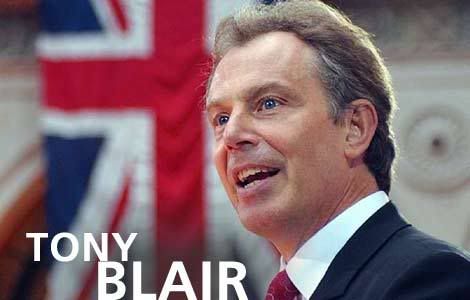
Tony Blair Labourvision interview: Life as PM, child poverty
Anthony Charles Lynton Blair (born 6 May 1953) is the outgoing Prime Minister of the United Kingdom, First Lord of the Treasury, Minister for the Civil Service, Leader of the Labour Party, and Member of Parliament for the constituency of Sedgefield in the North East of England. As a member of the British Cabinet he is also a member of the Privy Council of the United Kingdom.
Tony Blair became leader of the British Labour Party in July 1994 following the sudden death of his predecessor, John Smith. Under Blair's leadership the party abandoned many decades-old policy goals. Labour won a landslide victory in the 1997 general election, ending 18 years of rule by the Conservative Party; it was the worst Conservative defeat since 1832. Blair is the Labour Party's longest-serving prime minister, the only person to have led the party to three consecutive general election victories, and the only Labour prime minister to serve more than one full consecutive term.
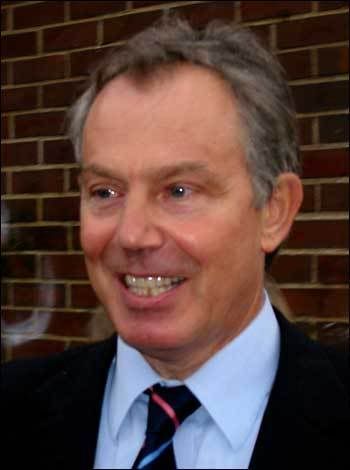
On 10 May 2007 he announced in his constituency of Sedgefield his intention to resign as Labour Party leader, and that his last day as Prime Minister would be 27 June 2007
http://en.wikipedia.org/wiki/Tony_Blair
Tony Blair, Political Leader
Born: 6 May 1953
Birthplace: Edinburgh, Scotland
Best Known As: British prime minister, 1997-
Name at birth: Anthony Charles Lynton Blair
Tony Blair became the youngest British prime minister of the 20th century when he took office in 1997. Blair was born in Scotland but spent much of his childhood in Durham, England. He studied law at Oxford and then practiced law until 1983, when he was elected as member of Parliament from Sedgefield. Blair was a member of the Labour Party, which at the time was dominated politically by the Conservative Party of Margaret Thatcher. Blair was soon a rising star of what became known as the "new Labour" movement, with positions more centrist on fiscal affairs and social issues like crime. He became leader of the Labour Party in 1994, and three years later was named prime minister, replacing John Major, when Labour won a Parliamentary majority. Blair was 44, making him the youngest British prime minister since Lord Liverpool in 1812. (Blair was often compared with the sitting U.S. president, Bill Clinton, who was 46 when he took office in 1993.) Blair was re-elected in Parliamentary elections in 2001 and 2005. He announced on 10 May 2007 that he would step down as prime minister on June 27th. He is expected to be succeeded as prime minister by the Chancellor of the Exchequer, Gordon Brown.
Blair's wife Cherie is also a lawyer. She is the daughter of the actor Anthony Booth and a distant relation to John Wilkes Booth, assassin of Abraham Lincoln... Tony and Cherie Blair have four children: Euan (b. 1984), Nicky (b. 1986), Kathryn (b. 1988) and Leo (b. 2000). According to Blair's official biography, Leo "was the first child born to a serving Prime Minister in over 150 years"... As a college student, Blair played in a rock band called Ugly Rumors.
http://www.answers.com/topic/tony-blair
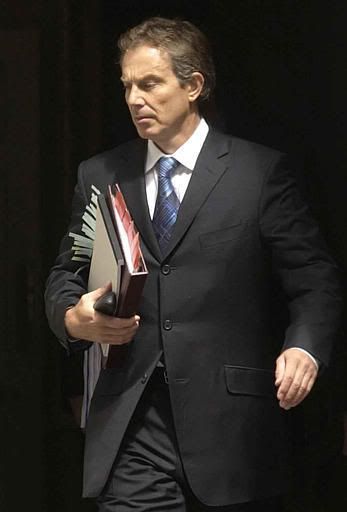
The Blair Legacy: Not Exactly Piffle
http://www.time.com/time/columnist/klein/article/0,9565,1053588,00.html
It was a day of monumental piffle on the campaign trail in Britain. The Conservative Party announced a major initiative to fight teenage binge drinking, which—given the much celebrated local custom—seemed as likely to succeed as a plan to oppose rain. Not to be outdone, Tony Blair's Labour Party announced an equally major initiative to meet the needs of a new, mythic electoral figure: the Schoolgate Mum, whose desires were said to include better school lunches, athletic activities and access to school nurses. This proved risible even to Labour Party stalwarts. "I thought we were going to call them Schoolgate Nans," said a leading Labour policy thinker, with a giggle. "You know, Mum's off working, so Nana—Grandma—waits for the kids at the school gate." Indeed, the only indication that there might be serious problems in Britain occurred at the periphery of the campaign: masked Islamic extremists invaded a press conference called by the moderate Muslim Council of Britain to discuss election concerns. The interlopers roughed up the group's spokesman and proclaimed that "voting for any political party will guarantee your seat in hellfire forever."
This, then, is Tony Blair's last campaign for Prime Minister. He has won two terms; a third, to match Margaret Thatcher's stern trinity, would be unprecedented for a member of the Labour Party. Win or lose—and he is likely to win—Blair will be remembered as an imposing figure, the man who saved the British left from socialist irrelevance. His "New" Labour has proved a more lasting achievement than Bill Clinton's "New" Democrats. It is a majority party that has combined prudent free-market economics with increased spending on social programs and a notable, if still incomplete, reform of the British welfare state. Yet Blair staggers to the finish line, unloved and untrusted.
"Do you accept that there is a trust issue?" the BBC's Jeremy Paxman asked Blair in an interview last week. Blair agreed but clumsily tried to spin it toward "trusting" Labour to sustain Britain's strong economy. Paxman, a brilliant barracuda, would have none of that: "All right, let's look at Iraq. When you told Parliament that the intelligence was 'extensive, detailed and authoritative,' that wasn't true, was it?" It took Blair some minutes of squirming before he could get around to making the case that Iraq was better off without Saddam, that 8 million Iraqis had voted, but Paxman, like much of the electorate, was unmoved—and unimpressed by Blair's fortitude in sticking to his unpopular position on the war. Most Brits consider the Prime Minister's decision to follow George Bush into Iraq under "false pretenses" weak and mendacious rather than principled. Indeed, Blair's advisers admit they are worried that women, strong Labour supporters in the past, now see the Prime Minister as shifty. Hence, the frantic attempts to salve the wounds of Schoolgate Mums.
Paxman's Iraq foray was rare in this campaign. Trust may be an issue, but Iraq isn't, largely because the Conservative opposition supported the invasion. The Tories are led by Michael Howard, a veteran Thatcherite brought in from the pasture for a last fling. He has chosen to run a campaign that is, by turns, ugly and inane. A prominent Tory told me that Howard is a great believer in the voodoo cooked up by political consultants and has decided to build his campaign around five issues that floated to the surface in focus groups. They are predictably anodyne—more cops, lower taxes—except for one: a tougher line on immigration, an issue that arouses deep passions and therefore needs to be handled delicately. The Tories have not been very delicate. Their remarkable campaign slogan, "Are you thinking what we're thinking?," is meant to be provocative, a sly reference to fears of a flood tide of mask-wearing extremists and veiled women invading England's pale land. If the polls can be believed, fear mongering hasn't helped the Tory effort. The third-place Liberal Democrats are led by Charles Kennedy, who has moved the party from bland moderation to more promising territory on the antiwar left. Kennedy is seen as a charming but puerile fellow, a man who announced his intention to quit smoking, then failed.
That leaves Blair, whose strongest plank in this sad valedictory is the assumption that he will leave office before the next election, handing the job to his longtime deputy, Gordon Brown, the popular Chancellor of the Exchequer. It also leaves a mystery: Blair's odd combination of success and unpopularity. Even before Iraq, the Prime Minister was seen as a cool, distant, slightly dodgy figure. That was due in part to Blair's personality—he is awkward at empathy, his nervous smile six teeth too many—but it is also a consequence of his creed. Blair, like Clinton, is an exemplar of the Third Way, which is not exactly a fighting faith. It is an attempt to take governance seriously, to provide needed services efficiently while removing the crushing indifference and incompetence of industrial-age bureaucracy.
This is not the stuff of high drama or splashy legacy. It is the stuff—well, all right—of more nutritious school lunches.
Blair, Bush defend war
http://www.cnn.com/2003/US/07/17/blair/
Timeline: Blair's 10 years of leadership
http://news.bbc.co.uk/1/hi/uk_politics/3827555.stm
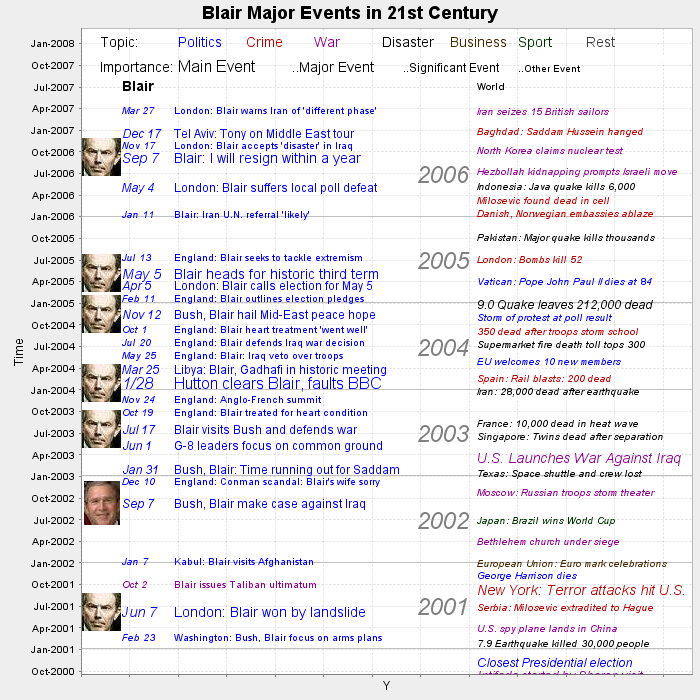
Tony Blair announces his exit
http://blogs.smh.com.au/newsblog/archives/global_grabs/013271.html
British Prime Minister Tony Blair has announced he will step down in late June after more than 10 years in Downing Street.
British Prime Minister Tony Blair has announced he will step down in late June after more than 10 years in Downing Street.
He is arguably Britain's most successful Labour leader.
Yet his strongest critics have accused him of employing spin over substance, pursing Thatcherite-like economic policies and, may be worst of all, araladiting Britain to America's neo-conservative agenda and holding hands with President Geortge W Bush to wage a disastrous conflict in Iraq.
Britain's foreign policy standing and influence may or may not be dented permanently by the Iraq misadventure.
Still there can be no denying that the Blair years have seen a transformation in Britain. It is far richer place now than in 1997. It is certainly a economic powerhouse in Europe even if Blair failed to meet one of his targets to integrate it further into the European Union. Sterling not the Euro is the currency still used on its high streets, supermarkets and swank West End fashion houses.
Like him or loathe him, there much to say about Tony Blair. Let's hear what you have to say.

Bush hopes Brown will continue Blair Iraq policy
http://timesofindia.indiatimes.com/World/The_United_States/Bush_hopes_Brown_will_continue_Blairs_Iraq_policy/articleshow/2030648.cms
WASHINGTON: Lauding the outgoing British prime minister as a "man of his word," US President George W Bush has expressed hope that Tony Blair's successor Gordon Brown would continue his Iraq policy as he "understands the consequences of failure".
"... I'll miss Tony Blair. He is a political figure who is capable of thinking over the horizon. He's a long-term thinker. I have found him to be a man who's kept his word, which sometimes is rare in the political circles I run in," Bush said in an interaction with the media after a briefing at the Pentagon.
"When Tony Blair tells you something, as we say in Texas, you can take it to the bank. We've got a relationship such that we can have really good discussions," he said.
On Blair's successor, Bush said "....I look forward to working with Gordon Brown ...I've had a meeting with him, and found him to be an open and engaging person."
The US president also described Britain's Chancellor of the Exchequer as "easy-to-talk-to and a good thinker."
"...I believe Gordon Brown understands the consequences of failure. But I'm looking forward to working with him. I'm looking forward to working with the new President of France.
"I'm looking forward to working with a lot of people in Europe to not only achieve success in Iraq, but also to achieve success in Afghanistan, another theatre in the war on terror," Bush said.
TONY BLAIR ATTACKS IRAN (verbally)
Tony Blair Takes Questions
Tony Blair - Should I Stay Or Go
Tony Blair Farewell Speech
Tony Blair Interview On Ch10 Israel
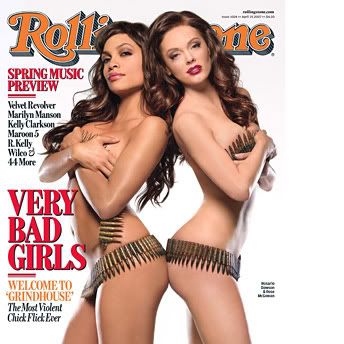











![Brotherhood" (2006) [TV-Series]](http://photos1.blogger.com/x/blogger2/1421/379621144723082/211/z/425926/gse_multipart33129.jpg)







No comments:
Post a Comment